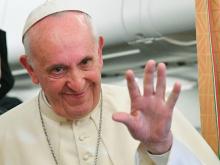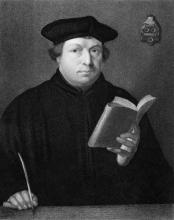oct. 31

Some Protestant churches mark the day as Reformation Sunday, and celebrate it on the Sunday just before, or just after, Oct. 31. More often than not, the hymns sung in church that day include “A Mighty Fortress Is Our God,” with words and music composed by Luther himself. But most members of Lutheran churches — the direct descendants of Luther’s movement — wait until Oct. 31. And that, as we know, is also Halloween, and has led to some creative celebrations for kids.

Pope Francis leaves on Monday, Oct. 31 for an overnight trip to Sweden, a historically Protestant country that today is one of the most secular in the world.
The visit is to mark the start of observances of next year’s 500th anniversary of the Reformation, which traditionally dates from Oct. 31, 1517, when Martin Luther nailed his 95 Theses to the door of a German cathedral.

DURHAM, N.C. — Protestants have traditionally celebrated Oct. 31 as the anniversary of the start of the Protestant Reformation, a movement that divided Western Christendom and gave birth to such diverse religious groups as Lutherans, Presbyterians, Anglicans, and Mennonites.
On Oct. 31, 1517, an Augustinian friar named Martin Luther nailed 95 theses for debate on the door of the Castle Church in Wittenberg, Germany, and so sparked a religious reform even he could not control.
But Luther's public life actually began five years earlier, 500 years ago this week, on Oct. 19, 1512, when he finished his formal theological education and was installed as a professor of Bible at a relatively new and still nonprestigious Catholic university in Saxony.
No one, least of all his patrons, expected this soft-spoken young man with a tenor voice and a bubbling sense of humor to turn into a religious bomb thrower, whose theological convictions would alter the religious and political structures of Europe for five centuries. Indeed, no one could have been more astonished by this unexpected development than Luther himself.